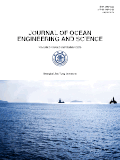
Journal of Ocean Engineering and Science
Scope & Guideline
Unraveling the mysteries of the marine world through science.
Introduction
Aims and Scopes
- Ocean Dynamics and Fluid Mechanics:
Research on the fundamental principles governing fluid motion in marine environments, including wave propagation, hydrodynamics, and fluid-structure interactions. - Numerical Modeling and Simulation:
Utilization of computational techniques and simulations to solve complex ocean engineering problems, particularly involving wave dynamics, ship design, and environmental impacts. - Wave Energy and Renewable Resources:
Investigation into the development and optimization of wave energy converters and other marine renewable energy technologies, focusing on efficiency and sustainability. - Marine Structures and Materials:
Study of the design, analysis, and performance of marine structures such as ships, offshore platforms, and underwater vehicles, including material properties and innovations. - Environmental Impacts and Mitigation:
Research addressing the effects of marine engineering activities on ocean ecosystems, pollution control, and the development of sustainable practices. - Mathematical Methods in Oceanography:
Application of advanced mathematical techniques, including fractional calculus and soliton theory, to model and analyze oceanographic phenomena.
Trending and Emerging
- AI and Machine Learning Applications:
An increasing number of studies are leveraging artificial intelligence and machine learning for predictive maintenance, ship performance optimization, and environmental monitoring, showcasing the integration of technology in ocean engineering. - Fractional Calculus in Modeling:
There is a growing trend in the application of fractional calculus to model complex oceanographic phenomena, enhancing the precision of simulations and analyses in various studies. - Environmental Sustainability and Climate Change Adaptation:
Research focusing on sustainable practices and adaptations to climate change is on the rise, reflecting a broader societal push for environmentally responsible engineering solutions. - Multi-Dimensional and Nonlinear Wave Dynamics:
Emerging studies are increasingly exploring multi-dimensional and nonlinear wave interactions, highlighting the complexities of ocean wave behavior and its implications for engineering applications. - Integrated Ocean Observation Systems:
There is a noticeable trend towards developing comprehensive ocean observation systems that combine various data sources and technologies for better monitoring and management of ocean resources.
Declining or Waning
- Traditional Ship Design Methods:
Research focused on conventional ship design principles has declined as the field gravitates towards more innovative, computational, and AI-driven design approaches. - Basic Hydrodynamic Studies:
While foundational hydrodynamic studies remain essential, there is a noticeable reduction in publications centered solely on basic principles, with a shift towards applied and complex modeling. - Static Analysis of Marine Structures:
There is a waning interest in static analysis methods, as dynamic and real-time analysis techniques gain traction in addressing the challenges of modern marine environments. - Local Environmental Studies:
Research focusing narrowly on localized environmental impacts is decreasing, as broader, integrative studies that consider global and system-level interactions become more prevalent. - Conventional Wave Prediction Models:
Traditional wave prediction models are being replaced by more sophisticated approaches employing machine learning and advanced statistical methods, leading to fewer publications in this area.
Similar Journals
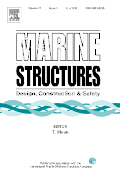
MARINE STRUCTURES
Transforming Ideas into Marine Engineering ExcellenceMARINE STRUCTURES, published by Elsevier Science Ltd, is a premier scholarly journal that has established itself as an essential platform for the dissemination of cutting-edge research in the fields of Marine Engineering, Ocean Engineering, and Materials Science. With an impressive H-index reflecting its substantial citation impact, and boasting a Q1 ranking across several categories including Materials Science and Mechanical Engineering as of 2023, this journal is recognized globally for its contributions to advancing knowledge and innovation in marine structures. The journal covers a wide range of topics, from the design and analysis of marine structures to the latest technologies and methodologies in ocean engineering, making it invaluable for researchers, professionals, and students alike. As the journal continues to publish high-quality articles that explore contemporary challenges and opportunities within the marine domain, it serves as a catalyst for collaboration and knowledge exchange among academia and industry. Researchers are encouraged to submit their original works and benefit from the rigorous peer-review process that ensures the quality and reliability of published content. MARINE STRUCTURES is not currently an open access journal, providing a subscription-based model that facilitates access to its authoritative body of knowledge.
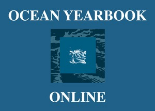
Ocean Yearbook
Empowering Research in Marine Law and Environmental PolicyOcean Yearbook, published by BRILL, is a leading academic journal in the field of maritime law and ocean governance, providing a comprehensive platform for researchers and practitioners in this vital area. With an ISSN of 0191-8575 and E-ISSN 2211-6001, this journal offers valuable insights and critical analyses on contemporary issues affecting the world's oceans, promoting interdisciplinary dialogue among scholars in law, environmental studies, and policy-making. Currently ranked in the Q2 quartile for Law, this journal is positioned among the top-tier publications, reflecting its commitment to academic excellence and relevance. Ocean Yearbook is essential reading for those looking to stay abreast of legal developments and emerging challenges in ocean governance, contributing significantly to policy discussions and academic scholarship worldwide. Its accessibility through subscription, combined with its ongoing commitment to high-quality research, makes it an indispensable resource for students, researchers, and professionals dedicated to understanding and protecting marine ecosystems.

CHINA OCEAN ENGINEERING
Charting New Waters in Mechanical and Ocean EngineeringCHINA OCEAN ENGINEERING, published by SPRINGER MEDIZIN VERLAG GmBH, is a prominent journal in the fields of Mechanical Engineering, Ocean Engineering, and associated environmental sciences. With its ISSN 0890-5487 and E-ISSN 2191-8945, this journal caters to a broad audience engaged in research and development related to ocean systems and technologies. As evidenced by its Q2 ranking in Mechanical Engineering and Ocean Engineering, as well as its Q3 placement in Oceanography and Renewable Energy, Sustainability and the Environment for 2023, it provides a critical platform for disseminating innovative research and progressive ideas in these dynamic and interdisciplinary fields. The journal is committed to advancing the science of ocean engineering by focusing on sustainable practices and technological advancement, making it an essential resource for researchers, professionals, and students alike. With contributions from leading experts worldwide, CHINA OCEAN ENGINEERING is dedicated to exploring the multifaceted challenges and opportunities presented by our oceans.

Indian Journal of Geo-Marine Sciences
Exploring the Depths of Marine KnowledgeThe Indian Journal of Geo-Marine Sciences, published by the NATIONAL INSTITUTE OF SCIENCE COMMUNICATION & INFORMATICS (NISCAIR), serves as a vital platform dedicated to the dissemination and advancement of knowledge in the field of marine and geosciences. As an open-access journal, it allows for improved visibility and accessibility of research findings to a global audience, enabling researchers, professionals, and students to share insights into oceanography and related disciplines. With a publication history spanning from 2007 to 2010 and continuing from 2012 to 2024, it has established itself within the academic community as a reliable source of innovative research, despite being classified in Q4 of Oceanography and holding a Scopus rank that places it in the 27th percentile. This journal is particularly relevant for those investigating marine ecosystems, geological oceanography, and their interconnections, thus playing an essential role in fostering understanding and communication within this important area of scientific inquiry.
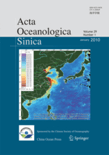
ACTA OCEANOLOGICA SINICA
Bridging Research and Marine ConservationACTA OCEANOLOGICA SINICA, published by SPRINGER, stands as a significant voice in the fields of Aquatic Science and Oceanography, contributing vital research and insights since its inception in 1985. With an ISSN of 0253-505X and an E-ISSN of 1869-1099, this journal maintains a strong international focus, delivering high-quality peer-reviewed articles that address pressing marine and freshwater environmental issues. Although it operates under a subscription model, its Q3 ranking in both Aquatic Science and Oceanography demonstrates its solid standing within Scopus, placing it in the 48th and 44th percentiles respectively. The journal aims to foster knowledge exchange and collaboration among researchers, professionals, and students by providing a platform for innovative studies and comprehensive reviews. With a dedicated editorial board and a commitment to advancing scientific understanding, ACTA OCEANOLOGICA SINICA serves as an essential resource for anyone engaged in the study of oceanographic phenomena and aquatic ecosystems.

Ocean Science Journal
Navigating the Frontiers of Marine ResearchOcean Science Journal, published by the Korea Institute of Ocean Science and Technology (KIOST), is a pivotal resource for scholars and practitioners in the field of oceanography. With the ISSN 1738-5261 and E-ISSN 2005-7172, this journal presents cutting-edge research from 2006 to 2024, bridging fundamental and applied ocean sciences. Based in South Korea, with its headquarters located in Busan, the journal has achieved a commendable Scopus rank of #72 out of 145 in the domain of Earth and Planetary Sciences, placing it in the 50th percentile among peer publications. Classified in the Q3 category of the 2023 Oceanography rankings, Ocean Science Journal offers a platform for innovative studies that advance understanding of marine environments and promote sustainable ocean practices. While it does not operate under an open access model, readers and contributors can expect high-quality, peer-reviewed material that addresses pressing oceanic challenges and developments. This journal serves as an essential tool for researchers, professionals, and students committed to fostering marine science and ocean technology.
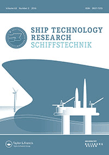
Ship Technology Research
Navigating the future of ocean engineering.Ship Technology Research, published by Taylor & Francis Ltd, is a premier journal dedicated to advancing the field of ocean engineering. Established in 1995, this journal provides a critical platform for cutting-edge research, innovative methodologies, and the latest developments in ship technology. With a notable Q2 ranking in the Ocean Engineering category for 2023 and placing in the 70th percentile of Scopus rankings, the journal serves as an essential resource for professionals, researchers, and students aiming to enhance their knowledge and contribute to maritime advancements. The journal not only disseminates high-quality research but also encourages collaboration across disciplines, addressing the real-world challenges faced in ship design, operation, and technology. As a non-open access journal, it continues to uphold rigorous standards, ensuring that published work is both relevant and impactful in fostering innovation in the maritime industry.
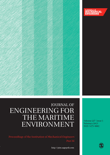
Proceedings of the Institution of Mechanical Engineers Part M-Journal of Engineering for the Maritime Environment
Advancing Knowledge at the Intersection of Technology and the SeaProceedings of the Institution of Mechanical Engineers Part M - Journal of Engineering for the Maritime Environment, published by SAGE Publications Ltd, is a leading scholarly journal that addresses critical advancements in the field of maritime engineering. With an ISSN of 1475-0902 and an E-ISSN of 2041-3084, this journal serves as an essential platform for researchers and practitioners alike, disseminating original research, reviews, and case studies relevant to mechanical and ocean engineering. Recognized for its rigorous peer-review process, it currently holds a commendable Q2 ranking in both Mechanical Engineering and Ocean Engineering. The journal's reputation is bolstered by its strategic emphasis on innovative practices and sustainability in maritime environments. By providing a valuable resource for interdisciplinary collaboration, the journal facilitates the intersection of technology and engineering solutions critical for the evolving challenges within the maritime sector. Researchers, professionals, and students alike will find this journal instrumental in keeping abreast of the latest developments, best practices, and future directions in maritime engineering.
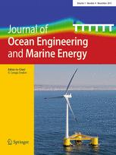
Journal of Ocean Engineering and Marine Energy
Exploring Innovations in Ocean Engineering and Marine EnergyJournal of Ocean Engineering and Marine Energy, published by SpringerNature, stands at the forefront of interdisciplinary research within the fields of ocean engineering and marine energy. Since its inception in 2015, this journal has aimed to address critical challenges and innovations in energy systems, particularly those harnessed from marine environments, thereby contributing to sustainable development and efficient resource management. With an esteemed Q2 ranking in multiple categories such as Energy Engineering and Power Technology, and Ocean Engineering, the journal serves as a vital platform for researchers, professionals, and students seeking to disseminate and engage with cutting-edge research and technological advancements. Boasting a robust readership and a commitment to open-access principles, the journal fosters a collaborative environment for the exploration of new ideas and approaches in a rapidly evolving sector. By bridging the gap between academia and industry, Journal of Ocean Engineering and Marine Energy remains instrumental in shaping the future of renewable energy solutions and environmental sustainability.

INTERNATIONAL JOURNAL OF OFFSHORE AND POLAR ENGINEERING
Connecting Global Expertise in Engineering DisciplinesINTERNATIONAL JOURNAL OF OFFSHORE AND POLAR ENGINEERING, published by the International Society of Offshore and Polar Engineers, is a prominent academic journal dedicated to advancing research in key engineering disciplines such as Civil, Mechanical, and Ocean Engineering. Established in 1991, the journal caters to a global audience, providing an essential platform for disseminating innovative findings and case studies pertinent to offshore and polar environments. With a focus on practical and theoretical applications, the journal ranks in the Q3 category across its relevant fields as of 2023, reflecting its significant contribution to civil and structural engineering, mechanical engineering, and ocean engineering. Although it does not offer open access, its rigorous peer-review process ensures that only high-quality research is published, making it a critical resource for researchers, industry professionals, and students invested in the dynamics of offshore and polar engineering. The journal's commitment to exploring emerging challenges and technological advancements underlines its importance in shaping the future of engineering practices in some of the world's most extreme environments.